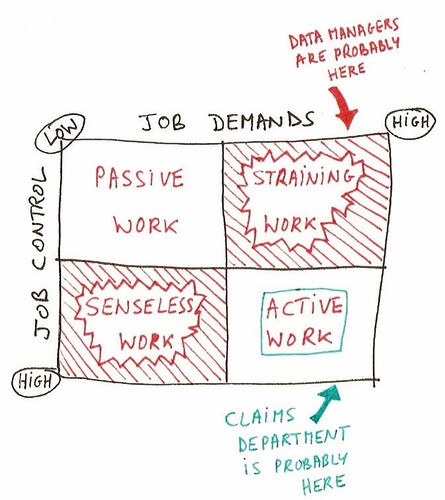Research suggests that the level of autonomy or job-control determines the level of stress and burnout to a larger extent than job-demand or complexity. For managers there is a lesson in there: Respect.
I was on the 5:50 pm train with Nancy. She works for the social security administration on a department I would simplify as ‘accounts receivable’. She talked to me about how puzzled she was by the high turnover in the team of datamanagers – a team that is fundamental in managing the accounts of about 6 million inhabitants (as you can guess: Flanders).
On the other had she was very surprised by the stabilty of the claims department. Not only do they have the straining job of hunting citizens to pay social security, they also need to take care of the complaints, excuses, arguments and plain threats. Because of that stress, she would have expected to witness a high turnover the latter team instead of the former.
The Insights
As an outsider who is keen on organizational behavior I immediately thought of the reseach on burnout. Two specific researches came to my mind:
1. The 1979 Karasek model (*) which is also known as the ‘job-demand-control model’. It illustrates that high job demands do not necessarily lead to burnout. The point here is not job demand but the ability to control the job at hand! In other words: are people supported by the right level of autonomy, context, framework, tools etc. in order to cope with the job demands? If yes: then the job is stimulating rather than exhausting. If no:… well … quite the opposite.

2. The 2006 research on Employee Burnout by by Lakshmi Ramarajan and Professor Sigal Barsade from Wharton suggests the same as Karasek: job control is the bottom line. In their research, Ramajaran and Barsade have elaborated this dimension a bit further. First, they found that respect (indeed: R-E-S-P-E-C-T) influences burnout above and beyond the effects of job demands. In their own words: “The impact of organizational respect on burnout is felt most strongly when job autonomy is low.” Autonomy (i.e. ‘Job Control’), the researchers note, can act as a buffer on stress – and actually decrease job burnout.
The Real Bottomline: Respect
And there is more. According to Ramajaran and Barsade, the extent to which others are treated can influence an individual’s own perceptions of respect. For example, when team members see someone else on the team being treated unfairly, they alter their own perceptions of the fairness of the team. In case you would not have a clue what Ramajaran and Barsade are referring to, have a look at this video of Tom Peters explaining the correlation between R-E-S-P-E-C-T and excellence in leadership: my gut feeling says it must be around 99,9%.
Of course, as an outsider I could be terribly wrong in my analysis but blogging about this topic was a good reminder of what really matters in the workplace. Thanks Nancy, for sparking these ideas!
______________
(*) Source: Karasek, R. (1979). Job demands, job decision latitude and mental strain: Implications for job redesign. Administrative Science Quarterly, 24, pp. 285-306.



Pingback: Luc’s Thoughts on Organizational Change » Love & Work (Part 2) – The Meaning of Life()
Pingback: Luc’s Thoughts on Organizational Change » Stress is the Fever of Burnout()